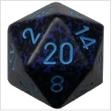One question a game designer must ask is how often players should be able to succeed at the actions they take. In many games, success is automatic: you can’t fail to use a capturing move in chess, say, or to buy a property in Monopoly. In fact, the majority of non-electronic games are based off of automatic success. This is not to say random elements – the roll of a die to determine movement, say, or the cards you draw from a shuffled deck – but most such games limit the actions you can take through randomness, rather than leaving up to chance whether or not you will be able to successfully take your actions.
RPGs are one major exception to this rule. Another is wargaming, roleplaying’s ancestor: Dungeons & Dragons evolved out of Chainmail, which took the mechanics of wargaming and applied them to the swords and sorcery genre. As part of its inheritance, Dungeons & Dragons relied heavily on dice to determine if player actions succeeded. (In fact, early editions of Dungeons & Dragons offered options to use dice to handle almost anything you might want to do in the game, from creating dungeons to determining which of twenty forms of insanity a character might develop if rendered insane, to figuring out what might happen if you mixed a potion of invisibility with a philter of love. More on this topic later in this series of posts.)
Later RPGs questioned the centrality of dice in the game, with many seeking to reduce randomness, and some eliminating it entirely in favor of some mix of gamemaster and player dictate. Often this came from the desire for stronger storytelling: both gamemasters and players rebelled at having a story shredded by a particularly ill-timed lucky (or unlucky) roll. But most RPGs kept dice. Why?
One reason is that dice can be exciting. Randomness – uncertainty – creates tension and variety. This is pretty obvious!
But a second reason is that randomness helps enhance the sense that the RPG is a simulation of reality. RPGs inevitably seek, to varying degrees, to simulate some version of reality, some cosmos. In the real world, we are used to the idea that our actions will not always succeed or have perfectly predictable results. The abstraction of the die roll provides a simple path to creating the same situation for our characters and their foes. It’s easier to imagine ourselves into the bodies of our characters when we can’t know if they will succeed or fail within the larger world.
Additionally, as simulations, RPGs must handle a huge variety of possible actions, situations, and outcomes. The RPG must be able to provide appropriate results depending on whether your warrior is trying to hit a cowering kobold, a veteran swordsman, an ancient dragon, or a deity (!). Probability is a great mechanism here, expanding success from a simple digital yes-no to an analog range. Boardgames cover a vastly smaller set of situations; with a simple possibility space comes the possibility of using simpler tools for resolving actions.
So die rolling is good, right? Hold on there, sparky! If there’s one thing any game designer, in any genre, knows, it’s that too much randomness – too much of that uncertainty mentioned above – can spoil the game-playing aspect of a game. Players want to have control, too; they want to feel that their skill has an effect on the outcome of the game. RPGs are funny beasts in many ways, and one is the tension they experience between giving players the unpredictability and simulationism enabled by die-rolling, and the desire to exert control. Mess up this equation, and your game will become less fun.
What’s more, dice rolling takes time. Every die roll involves a wait, and potential distraction from the flow of the game as a player digs for dice, adds up the results, and the roll gets checked against various charts and sheets to produce an outcome. Such is not a concern with computer games, but you can bet that card and board game designers worth their salt take this sort of thing into account.
Having looked at some theory behind randomness in RPGs, we can next look at how randomness has evolved in RPGs over time – and what it looks like for today’s CRPGs. That will be the topic of the next post in this series.


